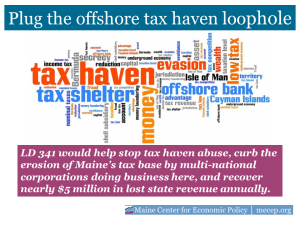LD 341 would help stop tax haven abuse and the erosion of Maine’s tax base by multi-national corporations doing business here
Augusta, Maine (Monday, March 9, 2015) The Maine Center for Economic Policy (MECEP) testified in support of LD 341, An Act to Prevent Tax Haven Abuse, legislation to stem the erosion of Maine’s tax base by multi-national corporations doing business here. MECEP presented testimony before a hearing of the legislature’s Joint Standing Committee on Taxation.
 “Corporate use of these off-shore tax havens to avoid Maine taxes costs the state $5 million in lost revenues annually,” said MECEP executive director Garrett Martin. “Current state law does not provide the authority to stop this tax avoidance. As a result, large out-of-state companies operating in Maine use Maine’s roads and bridges, our public safety, and our educated workforce, without paying their fair share of the cost for these public goods and services. Maine taxpayers pick up the tab while giving these big corporations a competitive edge over Maine’s smaller homegrown businesses.”
“Corporate use of these off-shore tax havens to avoid Maine taxes costs the state $5 million in lost revenues annually,” said MECEP executive director Garrett Martin. “Current state law does not provide the authority to stop this tax avoidance. As a result, large out-of-state companies operating in Maine use Maine’s roads and bridges, our public safety, and our educated workforce, without paying their fair share of the cost for these public goods and services. Maine taxpayers pick up the tab while giving these big corporations a competitive edge over Maine’s smaller homegrown businesses.”
MECEP testified that several other states have enacted requirements similar to LD 341. in their corporate tax laws. It noted that In 1984, as part of the Reagan Administration’s federal tax reform initiative, Treasury Secretary Donald Regan convened the Worldwide Unitary Taxation Working Group to address these issues. The use of offshore tax havens to avoid paying taxes in the US has grown exponentially in the thirty years since the Worldwide Unitary Taxation Working Group issued its report. MECEP also noted that more corporations have become international in scope and that the number tax attorneys, accountants, and other consultants which advise corporations on strategies to shift profits to tax haven countries has grown.
“The legitimacy of including in combined reports the income generated by subsidiaries located in foreign tax havens was widely recognized thirty years ago and today the problem of tax haven abuse is orders of magnitude larger than it was then,” MECEP economist Joel Martin said in written testimony submitted to the committee. “There is no doubt that corporations are shifting massive and growing amounts of profits earned in the United States to subsidiaries formed in foreign tax haven countries. LD 341 would help stop tax haven abuse and the erosion of Maine’s tax base by multi-national corporations doing business here. It would simply require corporations to include in their combined report income accruing to subsidiaries in tax haven countries.”
Johnson’s written testimony is available on MECEP’s website (click here).


